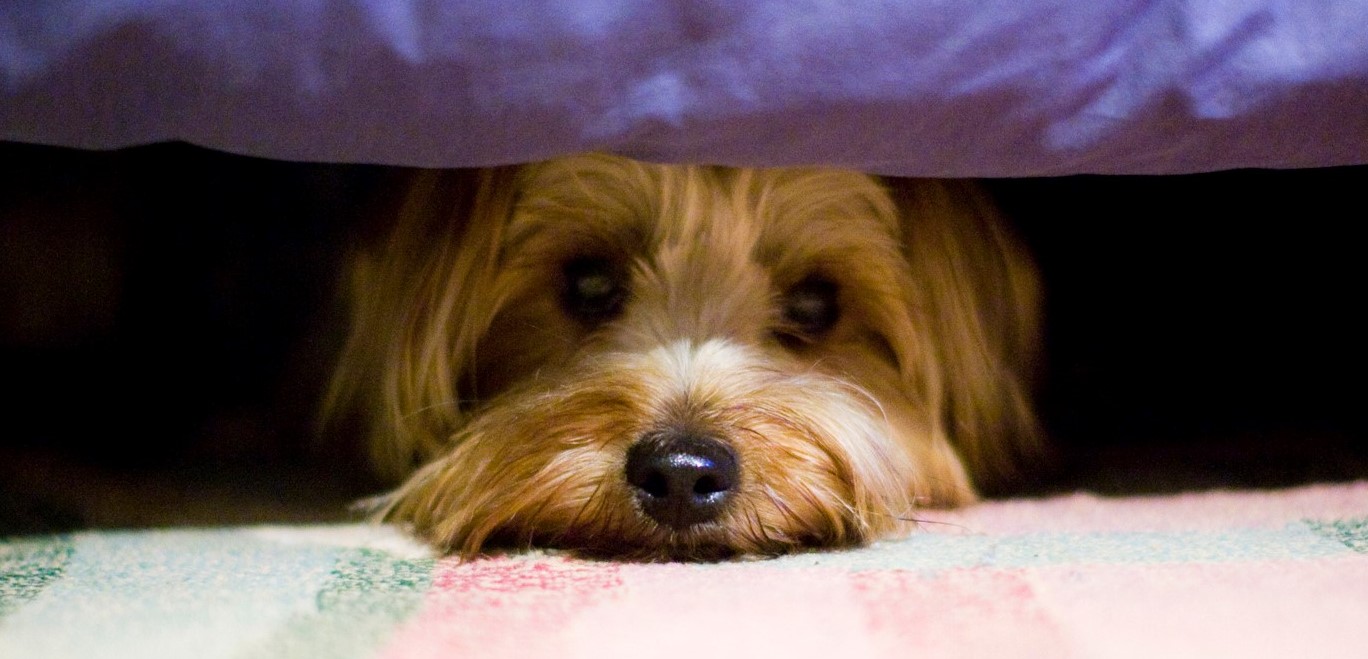

It’s the time of year again that we celebrate our nation’s independence, and fireworks are a staple of those festivities—but they can be terrifying for pets. The constant loud bangs, cracks, screeching, bright flashes, and burning smell of pyrotechnics can cause serious anxiety, stress, and fear in both cats and dogs. Even if a normally calm dog or cat has never tried to escape or run, this may be the time he suddenly bolts out an open door and over a fence or through a gate.
That’s why this is the busiest time of year at animal shelters across the country, as more pets panic over fireworks and end up lost, injured, or worse. Spooked dogs also tend to run farther as the noise continues than they might otherwise, which makes the chance of their safe return even less likely. Plus, canine hearing is far more sensitive than that of humans, so exposure to fireworks may even be painful to pooches.
The good news is that there are ways we can help our furry family member feel comfortable and safe through all the fireworks.
BE PREPARED
ID: Proper identification may be the only way to retrieve your pets should they become lost. Check that their collars are secure, with up-to-date and readable pet ID tags. Collars and tags can fall off, so make sure that microchips are registered and contain the correct information.
For an extra layer of protection, some companies now sell a GPS transmitter designed to attach to your pet’s collar. If you have horses, you might consider marking a safety (breakaway) halter with your contact information and leaving it on your horse during this stressful time.
Take a current photo of all of your cats, dogs, and horses—just in case they get out and you need to make “lost pet” signs.
Exercise: Take your dog out for a long walk, run, or other exercise in the cooler morning or at least several hours before fireworks celebrations. Cats benefit from indoor playtime exercise, too. By getting the energy out, they’ll have less to exert during the fireworks and will hopefully be less stressed. Plus, feed your pets a solid meal an hour or two prior the fireworks celebration. They'll feel relaxed and content like you do after a big meal.
LEAVE PETS INSIDE AT HOME
Keep your pets in the house rather than in your yard. Even if your pets are used to being outside, the panic caused by fireworks or other loud noises may make them try to escape in a terrified attempt to find safety.
Close and lock windows and doors so pets don’t push through screens and to muffle outside noise. Close the curtains or blinds of the room the animals are in to block outside sights and sounds.
Stay home with your pets, if possible. When left alone, pets are more likely to panic and pace around the house. Having a family member there is comforting, because when they’re scared, they are going to look for you.

CREATE A SAFE HAVEN
When fireworks start, some pets immediately seek out a dark hiding place. If that’s how they cope, help them find a dark, windowless place. Your dog or cat probably has a comfort zone he turns to when overwhelmed with stressed. Whether it’s behind the couch, under the dining room table, or even in a bathroom or closet, it's good for pets to have a go-to place to feel safe, secure, and calm. Set up their area with their cozy bed, a carrier or crate (if they’re already crate-trained and associate it as a safe space), a blanket, food and water, and their favorite toys.
SOUNDPROOF YOUR SPACE
A little white noise can help block out the worst of the fireworks. Turn on the TV or radio to a comfortable volume and your dog or cat may be distracted enough to ignore the scary noises outside. Run a fan or the air conditioning—the sound and vibration can help cover up the bothersome sounds. Play soothing music in the background to counteract the booming sounds. There are even CDs designed to help ease pets’ anxiety.
CREATE DISTRACTIONS
Give your pets a food-stuffed or otherwise special toy, or a long-lasting chew treat or bone, to encourage their minds to focus on that, not the noises outside. For some pets, chewing on something provides an outlet for their anxiety
If you're home when fireworks are going off, redirect your pets’ attention by playing with them. Not only will you distract them, but you may also help associate the noise with something positive like play and attention.
STAY CALM
This means you. Dogs and cats are very intuitive; they can sense and empathize with your fear and anxiety, and they have those feelings themselves. The most important thing you can do for your furry friend is to be calm and relaxed; this will encourage them to follow your lead. Talk in a normal voice, and ignore the sounds. Simply spend some time with your pets and help them feel comfortable.
MOOD MEDS & APPLYING PRESSURE
Many pets respond dramatically to homeopathic anxiety remedies like “Rescue Remedy,” sold at many pet or health food stores. If you know your pet gets dangerously distressed during fireworks, talk to your vet about possible short-term medication.
You might want to try wrapping them up. Applying gentle pressure to your dog or cat can be soothing and help ease anxiety. Pets react in the same way as babies when they are swaddled. Limiting their movements and covering them can help keep your pets at ease; some companies offer body wraps and “Thundershirts” for this purpose. There are even some earmuffs dogs can wear to block out loud noise.
Fireworks can be very frightening for our beloved pets, but by taking precautions and ensuring they are safe and comfortable indoors, you can prevent your pets from becoming scared or possibly even lost.